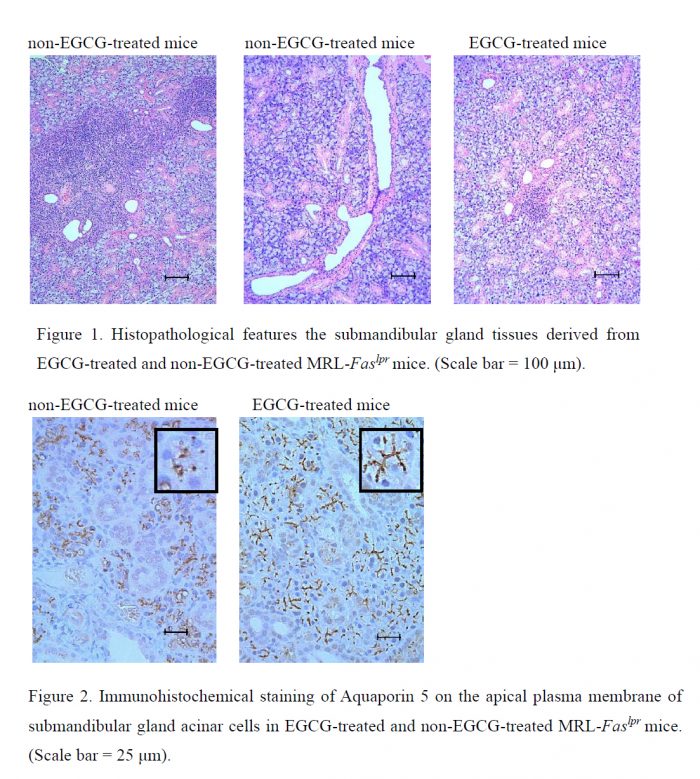Suppressive effects of green tea catechin on the development of autoimmune sialadenitis
2021.06.21 note
Sjögren’s syndrome is an autoimmune disease characterized by dry mouth and dry eyes. About 90 years have passed since the first case report was made by Swedish ophthalmologist, Dr. Henrik Sjögren. However, the pathogenic mechanisms and treatment methods have not yet been established, and it is designated as an intractable disease in Japan. It has been clarified that reactive oxygen species (ROS) are involved in the pathogenesis of this disease; thus, we are currently investigating the inhibitory effect of Epigallocatechin gallate (EGCG), a polyphenol known as an antioxidant, on autoimmune sialadenitis using MRL-Faslpr mice, a model of Sjogren’s syndrome [1] [2].

In the present study, administration of EGCG to MRL-Faslpr mice suppressed the development of autoimmune sialadenitis (Fig. 1). In addition, the expression of Aquaporin 5, which promotes saliva secretion, was increased on the apical plasma membrane of submandibular gland acinar cells in EGCG-treated MRL-Faslpr mice (Fig. 2). In the United States, green tea catechin tablets are marketed for the treatment of dry mouth under the trade name Migh TeaFlow®. Regarding the therapeutic effects of these tablets on 30 dry mouth patients (including 7 patients with Sjögren’s syndrome), there was an increase in salivary flow rate compared to patients taking placebo [3]. Also, NIH’s ClinicalTrials.gov, entitled “Green Tea Lozenges for the Management of Dry Mouth” (NCT01647737), describes the therapeutic effects of Migh Tea Flow® on dry mouth. The MRL-Faslpr mice used in this study have a mutation in the lymphoprolifertion (lpr) gene, a gene encoding Fas on chromosome 19. This gene mutation promotes lymphocyte cell division, inhibits apoptosis of lymphocytes, and provokes augmented autoantibody production (dsDNA, Sm, RF, ANCA, etc.) and hypergammaglobulinemia, leading to the development of autoimmune diseases such as glomerulonephritis, arthritis, sialadenitis, and vasculitis. MRL-Faslpr mice sold by The Jackson Laboratory (USA) were used for this study.
SAITO Keiichi, Assistant Professor, Liaison Center for Innovative Dentistry,
Graduate School of Dentistry, Tohoku University
MORI Shiro, Lecturer, Tohoku University Hospital
KODAMA Tetsuya, Professor, Graduate School of Biomedical Engineering, Tohoku University
References
[1] K. Saito, S. Mori, F. Date, M. Ono, Epigalocatechin gallate inhibits oxidative stress-induced DNA damage and apoptosis in MRL-Faslpr mice with autoimmune sialadenitis via upregulation of heme oxygenase-1 and Bcl-2, Autoimmunity 47 (2014) 13-22.
[2] K. Saito, S. Mori, F. Date, G. Hong, Epigallocatechin gallate stimulates the neuroreactive salivary secretomotor system in autoimmune sialadenitis of MRL-Faslpr mice via activation of cAMP-dependent protein kinase A and inactivation of nuclear factor κB, Autoimmunity 48 (2015) 379-388.
[3] SS De Rossi, J Thoppay, DP Dickinson, S Looney, M Stuart, KUE Ogbureke, S Hsu, A phase II clinical trial of a natural formulation containing tea catechins for xerostomia, Oral Surg Oral Med Oral Path Oral Radiol 118 (2014) 447-454.